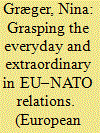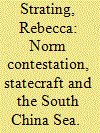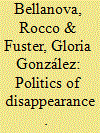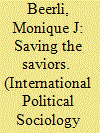|
|
|
Sort Order |
|
|
|
Items / Page
|
|
|
|
|
|
|
| Srl | Item |
| 1 |
ID:
141446


|
|
|
|
|
| Summary/Abstract |
There is a profound disconnect between the practice and scholarly study of security in Europe. The 2010 Internal Security Strategy added disasters such as forest fires, earthquakes, and floods to the list of European Union (EU) internal security concerns, expanding on the more traditional anxieties over militaries, border protection, and the effects of poverty. This article explores how evolving practices of disaster response, a policy area once separate from EU security discourse, have become part of the EU's wider security provision and with what implications. Based on interviews conducted at the Directorate-General (DG) for Humanitarian Aid and Civil Protection (ECHO), it provides a detailed study of three EU disaster response practices – monitoring, training, and information co-ordinating – and their circulation to the wider field of EU internal security provision. It uses this case to outline that new understandings of what it means to “voluntarily co-operate” in European security projects have been radically under-theorized.
|
|
|
|
|
|
|
|
|
|
|
|
|
|
|
|
| 2 |
ID:
154463


|
|
|
|
|
| Summary/Abstract |
Much scholarly work seeking to explain the EU–NATO relationship emphasises conflicting national or institutional interests, strategic individuals, and operational inefficiencies and overlaps. This article offers an alternative account of how both the everyday and the extraordinary in EU–NATO security cooperation can be identified and analysed by applying practice theory. Despite the “Cyprus issue”, which has left EU–NATO cooperation under Berlin Plus in political stalemate, regular interaction involving civilian and military EU and NATO staff at all levels and various sites has increased over the past decade. The article shows how a practice take is well suited to uncover the practical logic at work in these, predominantly informal EU–NATO encounters; how practices are established, enacted, and also abrupted. Furthermore, it discusses how shared “background conditions” – skills and experience – facilitate practices, learning, and community-building but also competition and rivalry.
|
|
|
|
|
|
|
|
|
|
|
|
|
|
|
|
| 3 |
ID:
186101


|
|
|
|
|
| Summary/Abstract |
Since 2009, the South China Sea disputes have taken on increasing global significance. Situated within a rapidly transforming political landscape, these sovereignty and maritime disputes are totemic of contests over the regional security order and the institutions, rules and laws that support it. The United States has explicitly called upon ‘like-minded’ allies and partners to defend the so-called ‘rules-based order’ against the revisionism of the rising People’s Republic of China, including in the maritime domain. In particular, the South China Sea has become a highly visible arena of ‘normative contestation’, one that raises questions about how norm-preservationist regional powers enact security practices to uphold their preferred vision of order. This study uses Australia as a regional power case study to assess the interests and approaches of a key US ally to normative contestation in the South China Sea. It addresses two questions: first, how does Australia perceive and articulate its interests in the South China Sea? Second, what security practices - diplomatic, legal and operational – can a regional power such as Australia bring to bear in its statecraft? It argues that as a regional power, Australia has adopted a normative approach to upholding maritime order. While Canberra has ratcheted up the rhetoric on the importance of maintaining the ‘rules-based order’ in response to China’s actions in the South China Sea, its security practices have retained a routine, ‘business-as-usual’ quality. This approach is designed to support maritime rules while avoiding economic retaliation from Beijing, reflecting broader strategic dilemmas as a middle-sized state wedged between two great powers. Unpacking the nuances of Australia’s South China Sea statecraft provides important insights for understanding for the preparedness and limitations of regional powers in defending their preferred conception of maritime order.
|
|
|
|
|
|
|
|
|
|
|
|
|
|
|
|
| 4 |
ID:
124456


|
|
|
|
|
| Publication |
2013.
|
| Summary/Abstract |
In 2008, debates over the deployment of body scanners in EU airports gave rise to imbroglios of technologies, bodies, law, and policies. Eventually, these entanglements appeared to be undone and resolved by the concealment of bodies from the screens of the machines-which had, meanwhile, been renamed security scanners. Using the concept of setting, this article describes the processes of disappearance operating among a vivid multiplicity of actants and connections and identifies three main paradoxical features characterizing them. Based on this analysis, the article advances the notion of the politics of disappearance, where heterogeneous elements-both material and immaterial, visible as well as invisible-actively contribute to the making of a security practice and, potentially, to the opening of political landscapes.
|
|
|
|
|
|
|
|
|
|
|
|
|
|
|
|
| 5 |
ID:
127806


|
|
|
|
|
| Publication |
2014.
|
| Summary/Abstract |
This article examines the impact of the practices of private security companies (PSCs) upon the fields of security and politics in the Czech Republic. It focuses on the scandalous case of the largest Czech private security company, Agency of the White Lion (ABL)/Mark2 Corporation (M2.C), whose founder attempted to create a business-firm-party by performing a hostile takeover of an existing minor political party. By applying the global security assemblages model and drawing on the recent literature on the commodification of security, this article situates the case of ABL/M2.C within the larger socio-political-legal-economic context of the booming private security industry, whose extensive linkages with Czech politics are best characterized as a 'reverse revolving door' phenomenon. This phenomenon in turn suggests a possibility that the continuing absence of specific legislation to regulate the activities of PSCs is due to too much, rather than too little, political interest in the activities of these organizations. This is problematic because the practices of PSCs have already contributed to a significant rearticulation of the Czech security field by enhancing the commodification of security, while ABL's use of security methods for political purposes has rearticulated the field of politics in a number of profoundly negative ways.
|
|
|
|
|
|
|
|
|
|
|
|
|
|
|
|
| 6 |
ID:
158667


|
|
|
|
|
| Summary/Abstract |
Tracing transformations in the way that humanitarian organizations respond to insecurity in the field, this article examines the bureaucratization and professionalization of security in relation to intraorganizational struggles between humanitarian professionals. Whereas some advocate for the triumph of remoteness and bunkerization as organizing principles of humanitarian action, others challenge the imposition of security as a humanitarian logic of practice through acts of nonconformity. These tensions are illustrative of professional struggles over how to do and think humanitarian action. In articulating a sociological and transversal reading, this article points to the heterogeneity and divisions structuring the humanitarian space. To provide empirical insights into the bureaucratic work practices of headquarters professionals and the everyday practices of frontline humanitarian professionals, this article draws upon an analysis of humanitarian security manuals, interviews with humanitarian professionals, and field observations in Port-au-Prince. The article sheds light on the development of the humanitarian profession and on the novelty of the work practices of humanitarian security professionals, while contributing to debates on bunkerization and the literature on transnational professionals.
|
|
|
|
|
|
|
|
|
|
|
|
|
|
|
|
| 7 |
ID:
145148


|
|
|
|
|
| Summary/Abstract |
The changing political and social meanings of space under conditions of advanced globalization point to the need to analyze security—or the deployment and management of violence—as a socio-spatial practice. This article draws attention to the “methodological nationalist’ bias that has traditionally characterized mainstream security studies, and discusses its effect on how security issues are studied and conceptualized. Building on insights from political geography and sociology, the article makes the case for a “spatial turn” in the field. It demonstrates how a socio-spatial approach can help make sense of evolving state security practices, and presents examples of non-national spaces of security—including cities, cyberspace, and the global polity. Such spaces are increasingly objects of security practices, although the implications of this remain largely under-theorized in security studies.
|
|
|
|
|
|
|
|
|
|
|
|
|
|
|
|
|
|
|
|
|